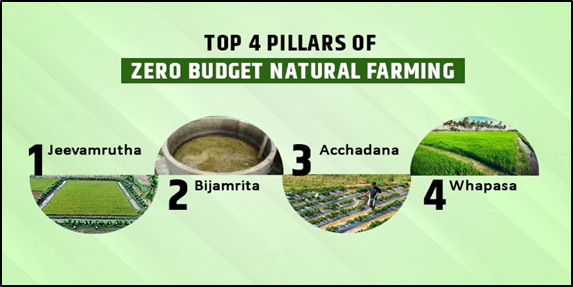In News:
- Recently, PM Modi said that Surat’s success in connecting 75 farmers in every panchayat with natural farming is going to become an example for the entire country.
- He made those observations while virtually addressing a conclave on natural farming held in Surat.
What’s in today’s article:
- About Zero Budget Natural Farming (Meaning, Purpose, Advantages, Criticism, etc.)
- Difference between ZBNF and Organic Farming
- News Summary (About Paramparagat Krishi Vikas Scheme)
Zero Budget Natural Farming (ZBNF):
- Zero budget natural farming is a type of farming practice that promotes chemical-free agricultural practices.
- It was originally introduced by agriculturist Subhash Palekar in the mid-1990s as an alternative to the Green Revolution methods such as the adoption of high yield variety seeds and use of inorganic fertilisers and pesticides.
- While current farming practices are driven by using chemicals, zero budget natural farming promotes low-cost inputs such as the use of:
- Cow dung, aged cow urine, jaggery, pulse flour and other plant-based extracts.
- Palekar has argued that the cost of external inputs such as pesticides and fertilisers were the leading cause of indebtedness and suicides among farmers in the country.
ZBNF is based on 4 pillars:

- ZBNF is based on the following four pillars defined by Subhash Palekar:
- Bijamrit – It is the microbial coating of seeds with formulations of cow urine and cow dung.
- Jivamrit – it is the enhancement of soil microbes using a mixture of cow dung, cow urine and jaggery.
- Mulching – It is the covering soil with crops or crops residue.
- Waaphasa – It is the building up of soil humus to increase soil aeration.
- In addition, ZBNF includes three methods of insect and pest management:
- Agniastra, Brahmastra and Neemastra (all different preparations using cow urine, cow dung, tobacco, fruits, green chilli, garlic and neem).
Why ZBNF is being Promoted:
- From the data provided by National Sample Survey Office (NSSO), 70% plus of farmers spend more they earn, and most farmers have debt.
- The indebtedness level is around 90% in states like Andhra Pradesh and Telangana, where each household has an average debt of Rs 1 lakh.
- To achieve the promise of the central government to double the income of farmers by 2022, one factor being considered is the method of zero budget natural farming.
Potential Advantages of practicing ZBNF:
- Zero budget natural farming reduces the initial cost of farmers.
- Cow dung adds soil value. It is full of nutrients value and available locally. This leads to improvements in the soil ecosystem.
- Bacteria of cow dung decompose the organic matter in soil and make soil for the plants.
- It required less electricity and water.
- It improves the productivity of the soil.
- It decreases the disease attack risk on the crop.
Criticism:
- Nature of Indian Soils:
- Indian soils are poor in organic matter content. About 59% of soils are low in available nitrogen; about 49% are low in available phosphorus; and about 48% are low or medium in available potassium.
- Indian soils are also varyingly deficient in micronutrients, such as zinc, iron, manganese, copper, molybdenum and boron.
- Micronutrient deficiencies are not just yield limiting in themselves; they also disallow the full expression of other nutrients in the soil leading to an overall decline in fertility.
- Lack of access to native cows:
- Subhash Palekar suggests that cow dung and cow urine should be obtained from native cow breeds only.
- Given that most Indian farmers are small and marginal farmers, not all of them have a native cow.
- Over the last five decades, native breeds—which are well adapted to the local climate and are disease resistant—have been systematically replaced with cross breeding from exotic, foreign stock.
- External bio-inputs and labour are required:
- Preparation of the concoctions using cow urine and cow dung require a lentil powder and jaggery, which have to be purchased by most farmers.
- An additional cost to the farmer is the labour-intensive application of Bijamrit and Jivamrit.
- In cases where farmers own smaller, fragmented lands, it adds to the difficulty.
- Lack of independent studies:
- Currently, there are no independent studies to validate the claim that ZBNF plots have a higher yield than non-ZBNF plots.
- The Indian Council of Agricultural Research (ICAR) is conducting studies on the ZBNF methods. Such studies will need at least 3 years to arrive at a conclusion.
Difference between ZBNF and Organic Farming:

News Summary:
- Recently, Prime Minister Narendra Modi addressed a conclave on natural farming, held in Surat, Gujarat.
- He opined that if there’s a people’s movement on natural farming, it will be a huge success in the coming days.
- He also spoke about the measures taken by the Union government for promoting natural farming through schemes like the ‘Paramparagat Krishi Vikas Scheme’.
Paramparagat Krishi Vikas Scheme:
- The Paramparagat Krishi Vikas Scheme was launched by the Union government in 2015.
- Objective: To supporting and promoting organic farming, in turn resulting in improvement of soil health.
- The scheme stress on end-to-end support to organic farmers i.e. from production to certification and marketing.
- Post-harvest management support including processing, packing, marketing is made integral part of these schemes to encourage organic farmers.
- Under PKVY, farmers are provided financial assistance of Rs 50,000 per hectare/ 3 years.
- Out of this Rs. 31,000 (62%) is provided directly through DBT for inputs (bio fertilizers, bio-pesticides, organic manure, compost, vermi-compost, botanical extracts etc).









